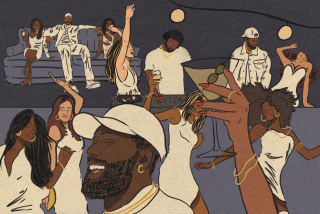Jeezy just can’t shock like Imus
- Share via
ON the one hand you have a casual, deplorable attempt at Ebonics that cost a vaunted talk-show host his career and has made a nation of cable subscribers and radio listeners search its collective soul.
On the other, you have a trash-talking rap group actively courting controversy with a race-baiting song called “White Girl” -- with lyrics that could easily be misconstrued as promoting sexual enslavement. It’s been greeted with a “So what?” by rap fans and the mainstream media to become one of the great non-stories of the year.
The disparity of public reaction to radio and TV talk show host Don Imus’ disparagement of the Rutgers University women’s basketball team (that led to his recent firing by CBS Radio and MSNBC) and the hip-hop group Young Jeezy & USDA’s new single could hardly be wider. But taken together, the outrage at Imus and apathy toward “White Girl” highlight a certain disconnect between popular culture and political propriety.
“The envelope keeps getting pushed,” said Erik Parker, director of content at the hip-hop website SOHH.com. “You’ve got to come up with something extremely controversial, something ... to make people in hip-hop culture pause. But if Imus says it, it’s going to stand out like a sore thumb.”
The song hit the Web last month, ahead of its official May release on the album “Young Jeezy Presents USDA: Cold Summer.”
Despite “White Girl’s” deliberately provocative title, it is actually a codified ode to drug pushing set to slinky synth-pop and a backbeat of heavy bass. And the titular “girl” is cocaine.
A self-professed former drug dealer, Jeezy has staked his reputation as one of the progenitors of the “cocaine rap” subgenre by boasting about his street exploits on wax. The single’s metaphorical content comes as even less of a shock, however, when considered against the group’s name; USDA stands for “United Streets and D-Boys of America” (and the D is for dope).
But the only outcry came on the heels of a botched promo effort by the group’s label, Def Jam/Corporate Thugz Entertainment. The idea was to enlist 18- to 24-year-old white females to handle street promotions for the single in 13 cities, including Los Angeles, New Orleans and Minneapolis. “For the first time in the rap game history, we [are arranging to] get us a street team of nothing but pretty white girls to promote this single,” USDA rapper Slick Pulla told StreetHop.com.
In an almost direct counterpoint to the controversy generated by Imus’ two-second sound byte, rap fans responded by criticizing the sex-sells aspect of the marketing ploy as a “gimmick,” while ignoring “White Girl’s” racial implications. In the end, the label pulled the plug on the promotion.
“Hip-hop tends to deal with race straight up in a raw and aggressive manner,” said Parker. “It’s brazen to title it ‘White Girl.’ But the bar for rappers keeps getting higher and higher. It’s become expected of them to get into trouble. In terms of lyrical content, almost nothing is too outrageous.”
Happy Mondays, minus happy hour
FROM 1985 to 1992, the Happy Mondays revolutionized British dance music with its cosmic slop of rave electronica, indie rock and psychedelic disco. Until the band members succumbed to their various drug addictions and self-destructive lifestyles (as dramatized in the 2002 movie about the “Madchester” scene, “24 Hour Party People”) few could rival them in funky bass lines or chemical ingestion.
Now, 15 years later and two failed reunions under their belts, the remaining trio of Mondays -- lyricist Shaun Ryder, backup dancer Bez and drummer Gary Whelan -- return with a new album and a Southland tour appearance. The band will play the Coachella Valley Music & Arts Festival next weekend.
Ryder said in an announcement that the April 29 performance would mark the first time he has performed “straight,” as in “not using crack or heroin or whatever.” He added: “It’s [expletive] terrifying!”
Pimp my, um, green machine?
NOTHING says Earth Day quite like a gas-guzzling vintage auto driven by a killer robot from the future.
That seems to be the view over at MTV, which will air a special episode of “Pimp My Ride” tonight in observance of the global environmental appreciation day.
The show’s plot: California governor Arnold Schwarzenegger teams up with gangsta rapper-host Xzibit to “pimp” a ’65 Chevy Impala by swapping out its engine for an 800 horsepower Duramax that runs on biodiesel fuel.
“I am very encouraged by the great potential in converting vehicles to run on biodiesel as a way to reduce greenhouse gas emissions,” the Governator said in a statement.
In fairness, it’s been 23 years since the Humvee-loving Schwarzenegger first portrayed “The Terminator.” And in the meantime, he signed into law the country’s first statewide cap on emissions of heat-trapping gases that are blamed for global warming.
Still, it’s downright bizarre to see a guy so closely identified with SUVs give an eco-retrofit to a vehicle so closely identified with drive-by shootings.
As any N.W.A completist will tell you, the ’64 Impala -- the mythical “six-fo” rapped about by Snoop Dogg, Dr. Dre and Eazy-E, among others -- is the gangsta equivalent of a Rolls Royce.
More to Read
The biggest entertainment stories
Get our big stories about Hollywood, film, television, music, arts, culture and more right in your inbox as soon as they publish.
You may occasionally receive promotional content from the Los Angeles Times.









